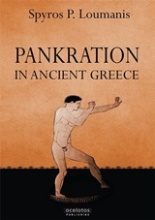Pankration in Ancient Greece
Greek mythology tells us that pankration was devised by Theseus to overcome the Minotaur in the Labyrinth. In reality, its origins have been lost in time. Pankration began as a form of self-defense, to be sure. It may well have evolved from the most primitive form of conflict used by humans against other humans or animals. As pankration developed, the instinctive movements acquired structure and became a technique to be learned as part of the training of warriors. In its fullest form, it included techniques from boxing, throws from wrestling, kicks and strikes with the knees and elbows, strangleholds and choke holds, dislocations, immobilization, and defensive strikes and holds. Pankration was the first scientific method of unarmed combat in the world. As an official sport at the great "sacred games" of antiquity, it was the most popular. Its techniques were refined and tactics were incorporated as training became a science, with added dimensions of diet, medicine and philosophy. At the Olympian, Isthmian, Nemean and Pythian games, and at another 500 games held annually, pankratiasts demonstrated their courage and strength, without weight classes or the benefit of protective equipment, as they sought to achieve a knockout victory. They earned the admiration of spectators and victors became glorious heroes. Poets praised their achievements and sculptors created statues that enshrined them in eternity. This book has endeavored to gather all of the information on pankration in its original form, from the time when it first appeared through the development of technique and methods of training. It presents a look at the social and cultural environment in which it flourished, the great competitions and lists for the first time all of the names of the great victors with information about their life. The honors they received and their social origins are documented, along with the influence of pankration on education and its course through Asia and Europe. The history of ancient Greek civilization rises out of the history of pankration and we are given a look at how its impact has extended to the modern day.
- ISBN978-960-564-480-2
- Ημ/νια Έκδοσης2017
- Σελίδες290
- ΔέσιμοΜαλακό εξώφυλλο
- Διαθέσιμες Γλώσσες
- Θεματολογίες Βιβλίου
- Συγγραφέας
- Εκδότης

